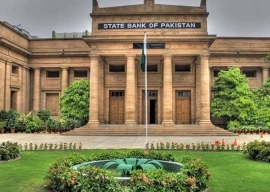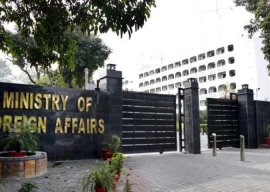
Supreme Court Justice Mansoor Ali Shah has warned that the looming threat of climate apartheid - a stark divide between the climate resilience of developed and developing nations -- could deepen if financial gaps persist.
Addressing the opening session of the Pathways to Development Conference on climate justice, he said that without robust financial mechanisms, the global South, including Pakistan, faces worsening inequities in addressing climate challenges and ensuring basic human rights.
Highlighting the critical role of climate finance, he said it is pivotal for the global South, where countries like Pakistan contribute minimally to global emissions yet bear the brunt of climate disasters. Pakistan ranks as the 8th most affected nation by pollution despite its negligible role in global emissions. "Climate finance ensures the most vulnerable can live with dignity," he said, stressing the need for sustainable mechanisms at the local, national and transnational levels.
Reflecting on Pakistan's judicial history, he noted that landmark environmental decisions from the 1990s had failed to create on-ground impact due to gaps in implementation.
"Judges have issued directions for climate action, but the government has yet to demonstrate political will or address the financial challenges of executing these orders," he remarked.
Justice Shah identified climate justice as intersecting issues of health and water security, disaster management, and even human trafficking. He pointed out the contrasting judicial perspectives between the global North and South, where courts in developing nations address issues like irrigation, urban planning and industrial pollution under the expanding scope of climate action.
Despite the establishment of mechanisms like the Green Climate Fund targeting $100 billion annually, only 25 per cent of promised funds have been disbursed. This has left countries like Pakistan struggling to finance recovery from catastrophic events, such as the $20 billion needed to address last year's floods.
Justice Shah highlighted systemic hurdles like bureaucratic inefficiencies, inequitable fund allocation and power imbalances that favour larger economies like India and Brazil.
He also criticised inconsistent policies, stating that while international engagements such as a UN conference in Baku had showed promise, the absence of a finalised national climate policy and actionable plans remained a major drawback. To bridge the gaps, Justice Shah suggested innovative solutions like Islamic finance, carbon markets and establishing a dedicated climate change apex body.
Courts, he said, must play a transformative role by ensuring judicial oversight in the implementation of climate finance for vulnerable communities.
The concept of 'climate debt' was underscored as an obligation developed nations owe to the global South. Without addressing this debt, the divide could escalate into climate apartheid, threatening fundamental rights enshrined in constitutions worldwide.
Justice Shah concluded by urging global cooperation and the urgent disbursement of finance to address the triple planetary crises of climate change, biodiversity loss and pollution.
In another session of the conference hosted by LUMS, Vice Chancellor Dr Ali Cheema talked about land reforms. He said there were trivia of property and legal system where generations after generations fought to get the inheritance of joint property. Dr Cheema said the way forward of property reforms was to change the law.
Federal Ombudsperson against Harassment Fauzia Viqar stressed that one of the problems of property rights lies with the person's socioeconomic factors, so it is not the gender but more about how powerful one is. She said women still had inherited disadvantages that flowed through the system.


1734395313-0/Selena-(6)1734395313-0-165x106.webp)
1733729230-0/jay-z-(1)1733729230-0-165x106.webp)
1719921789-0/dua-lipa-(1)1719921789-0-165x106.webp)
1734391172-0/Untitled-design-(51)1734391172-0-165x106.webp)




1734342307-0/Untitled-design-(90)1734342307-0-270x192.webp)







COMMENTS
Comments are moderated and generally will be posted if they are on-topic and not abusive.
For more information, please see our Comments FAQ